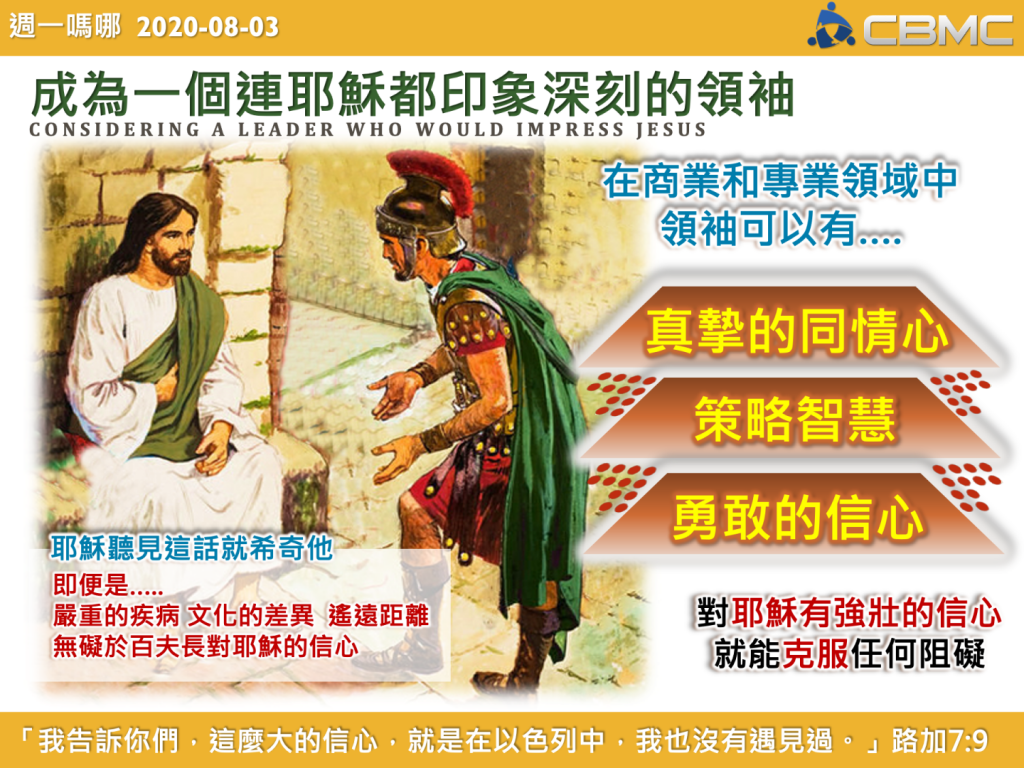成為一個連耶穌都印象深刻的領袖──CONSIDERING A LEADER WHO WOULD IMPRESS JESUS
一個經常使人忽略讓企業能成功的關鍵是:給人們留下正面的印象,尤其是對居高位有影響力的人。俗話說的好:對於留下「好的第一印象」,你永遠沒有第二次機會。所以,如果你有一個機會的話,你想讓誰刮目相看?
讓我們先跳脫商業場域,思想怎麼樣的人會讓這麼偉大的耶穌基督印象深刻呢?祂可以說是超過歷史上任何人,對所有國家和文化的人類產生影響力的那位。路加福音第七章記載了一名使耶穌都驚奇的領袖。這名領袖和耶穌不同,並不是猶太人。相反的,他是外邦人,一名羅馬百夫長。
這個簡短的故事內容是:一名統領數百人的羅馬軍官,請求耶穌醫治他的僕人。在他身上,我們看到了許多成為更好領袖的特質;即便是在沒有人情味、冷酷嚴峻的商業及專業領域中 。
領袖的真摯同情心。路加福音7章2節記載:「有一個百夫長所寶貴的僕人害病,快要死了。」我們發現這位軍官的首要特質是同情心。他極其重視自己的僕人,甚至為他尋求超自然的醫治。考慮到當時的時空背景和兩人懸殊的身分地位,他的行為令人匪夷所思,非常具有同情心。試問你自己,到底有多照顧團隊中的每個成員,包含在你底下做事的員工?
領袖的策略智慧。這名百夫長的第二個明顯的特質是他的策略智慧。他原本可以私下懇求,甚至用軍方的權力脅迫耶穌。然而,這位羅馬長官認為自己作為外邦人,對耶穌恐怕沒有太大的影響力。路加福音7章3節說:「百夫長風聞耶穌的事,就託猶太人的幾個長老去求耶穌來救他的僕人。」這個百夫長明智地選擇了與耶穌有直接關係的猶太人領袖替他代言。選擇合適的人來代表自己提出請求,顯示領袖具備策略智慧。
領袖的勇敢信心。這名要求耶穌行神蹟醫治僕人的百夫長,所表現出來的最後一個特質是:勇敢的信心。他顯然聽聞過耶穌和祂所行的神蹟。他雖然是外邦人,並不在耶穌的影響範圍之內,卻完全相信耶穌能醫好他的僕人。更令人驚訝的是,他還堅信耶穌可以不用到現場,直接用話語就能成就醫治!
這就是為什麼路加福音7章9節如此記述:「耶穌聽見這話,就希奇他,轉身對跟隨的眾人說:『我告訴你們,這麼大的信心,就是在以色列中,我也沒有遇見過。』」百夫長不僅相信耶穌能使他的僕人恢復健康,還相信祂可以不限距離地行神蹟。
這名百夫長為僕人的代求顯明:無論是嚴重的疾病、文化的差異或遙遠的距離,都無礙於他對耶穌醫治能力的信心。同樣的,我們所有的人都應當禱告:我們對耶穌的信心足夠強壯,能克服任何阻礙以及商業上所遇到的所有問題。
© 2020版權所有非傳統商業網路(前身為純全資源中心)。節錄自和Rick Boxx的純全時刻,這本刊 物主要是從基督徒的角度來探討職場上正直這個主題。如果希望知道更多關於這個事工或是想訂閱每日純全時刻,請上這個網站: www.unconventionalbusiness.org. Rick Boxx最新出版的書「提供實用五個關鍵的神的方法來建立企業。」
反省與問題討論
- 請分享文章開頭問題的答案:如果你有一個機會的話,你想讓誰刮目相看?
- 你能想像這名羅馬百夫長,決定請這位行過無數神蹟奇事的奇妙耶穌,救助自己深愛的病重僕人時,心中的壓力嗎?你覺得這位百夫長的心路歷程是甚麼?
- 你認為在現代的商業和專業的領域中,同情心能起什麼作用?你常常看到有人表現出同情心嗎?如果有,是以什麼方式?如果沒有,你覺得為什麼同情心如此稀罕?
- 本週的週一嗎哪認為,百夫長知道找誰代表他請求耶穌,是所謂的「策略智慧」。請舉出你曾經在自己的工作環境中,經驗過或是運用過的策略智慧。
備註:如果你手上有聖經,想要讀更多和這個主題相關的內容,請參考:
約書亞記1章6、7、9節
1:6 你當剛強壯膽!因為你必使這百姓承受那地為業,就是我向他們列祖起誓應許賜給他們的地。
1:7 只要剛強,大大壯膽,謹守遵行我僕人摩西所吩咐你的一切律法,不可偏離左右,使你無論往
哪裏去,都可以順利。
1:9 我豈沒有吩咐你嗎?你當剛強壯膽!不要懼怕,也不要驚惶;因為你無論往哪裏去,耶和華─
你的 神必與你同在。」
箴言1章7節
1:7 敬畏耶和華是知識的開端;愚妄人藐視智慧和訓誨。
箴言2章6節
2:6 因為,耶和華賜人智慧;知識和聰明都由他口而出。
箴言10章14-15節
10:14 智慧人積存知識;愚妄人的口速致敗壞。
10:15 富戶的財物是他的堅城;窮人的貧乏是他的敗壞。
箴言14章8節
14:8 通達人的智慧在乎明白己道;愚昧人的愚妄乃是詭詐(或譯:自欺)。
約翰福音13章34-35節
13:34 我賜給你們一條新命令,乃是叫你們彼此相愛;我怎樣愛你們,你們也要怎樣相愛。
13:35 你們若有彼此相愛的心,眾人因此就認出你們是我的門徒了。」
雅各書1章5-6節
1:5 你們中間若有缺少智慧的,應當求那厚賜與眾人、也不斥責人的 神,主就必賜給他。
1:6 只要憑著信心求,一點不疑惑;因為那疑惑的人,就像海中的波浪,被風吹動翻騰。

CONSIDERING A LEADER WHO WOULD IMPRESS JESUS
By Rick Boxx
One of the underestimated keys to business success is the ability to make a good impression on people we meet, especially those in positions of influence. And we all know the truth of the adage, you never get a second chance to make a good first impression. So, if you had the opportunity, what individual would you like to impress?
Shifting from the realm of the marketplace, what do you think it would have taken to impress someone of the magnitude of Jesus Christ? He arguably has had more influence over people from every nation and culture than anyone else in history. Yet, in chapter 7 of the gospel of Luke we read about a man who caused Jesus to marvel. This is particularly notable because unlike Jesus, this leader was not even a Jew; instead, he was a Gentile, a Roman centurion.
This brief story tells us about a military leader, an official who commanded hundreds, asking Jesus to heal his servant. In this centurion we see several qualities which can help each of us become better leaders, even in the often impersonal, even harsh business and professional world.
The leader’s deep compassion. In Luke 7:2, we read, “And a centurion’s slave, who was highly regarded by him, was sick and about to die.” The first quality we discover is the officer’s compassion. We are told he regarded his slave highly and cared enough to pursue divine healing for him. This was extremely uncommon for that day, given the different standing of the two individuals, and very compassionate. How far would you go to care for each member of your team, including those who are under your authority?
The leader’s strategic wisdom. A second attribute about this centurion that stands out is his strategic wisdom. He could have pleaded his case personally, or even tried to exert his official power to intimidate Jesus. Being a Gentile, however, this Roman leader suspected he would not have much sway over Jesus. Instead, Luke 7:3 states, “When he heard about Jesus, he sent some Jewish elders asking Him to come and save the life of his slave.” This centurion wisely chose the Jewish leaders, people with a direct connection to Jesus, to ask on his behalf. Selecting the right people to represent you and your cause reveals strategic wisdom.
The leader’s courageous faith.The final attribute we see exhibited by this Roman centurion who asked Jesus to miraculously heal his servant is his courageous faith. He had obviously heard about Jesus and His miracles. Despite being a Gentile and not a Jew, basically an outsider to Jesus’ immediate sphere of influence, the officer completely believed that Jesus could heal his servant. What is even more remarkable, he was also convinced that Jesus could command healing without even being present!
This is why in Luke 7:9 we are told, “Now when Jesus heard this, He marveled at him, and turned and said to the crowd that was following Him, ‘I say to you, not even in Israel have I found such great faith.’” The centurion not only believed Jesus could restore his servant to health, but also that He could accomplish it by long distance.
The centurion’s act of intercession showed that nothing – serious illness, cultural differences or distance – could deter his faith in Jesus’ healing ministry. In a similar way, we should all pray that our faith in Jesus remains strong enough to overcome whatever obstacles and business problems come our way.
© 2020, Unconventional Business Network Adapted with permission from “Integrity Moments with Rick Boxx,” a commentary on issues of integrity in the workplace from a Christian perspective. To learn more or to sign up for Rick’s daily Integrity Moments emails, visit www.unconventionalbusiness.org. His latest book, Unconventional Business, provides “Five Keys to Growing a Business God’s Way.”
Reflection/Discussion Questions
- How did you answer the opening question: Who, if given the opportunity, would you like to impress?
- Can you imagine the tension the Roman centurion must have felt in determining to reach out to the amazing Jesus, the worker of miracles, to help his beloved but very sick slave? What do you think must have been going through the officer’s mind?
- What is the role of compassion in the business and professional world today? Do you see it being demonstrated very often? If so, in what ways? If not, why is it so unusual in your opinion?
- This “Monday Manna” refers to “strategic wisdom” in the centurion’s knowing who should represent his case to Jesus. What are some examples of strategic wisdom you have experienced – or even been able to utilize in your own work situations?
NOTE: If you have a Bible and would like to read more about this subject, consider the following passages: Joshua 1:6,7,9; Proverbs 1:7, 2:6, 10:14-15, 14:8; John 13:34-35; James 1:5-6


